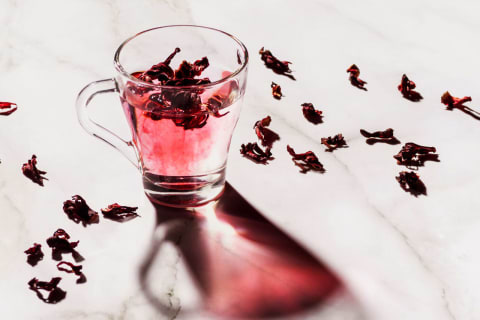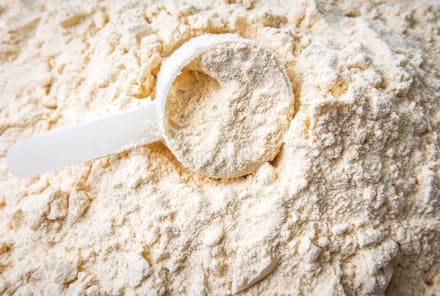Advertisement
10 Cooling Teas That Are Packed With Health Benefits


Ashley Jordan Ferira, Ph.D., RDN is Vice President of Scientific Affairs at mindbodygreen. She received her bachelor's degree in Biological Basis of Behavior from the University of Pennsylvania and Ph.D. in Foods and Nutrition from the University of Georgia.
Whether after a workout or an unusually warm day, sometimes we just need to cool and calm down. Drinking refreshing iced tea is a yummy way to help keep your body cool. Many herbal teas come packed with nutrients and plant phytochemical bioactives that have beneficial health properties1, like antioxidant, anti-inflammatory, antibacterial, antiviral, anti-allergenic, and anti-aging (to name a few) properties.
I’m an herbalist, and here are 10 of my favorite cooling herbs. I encourage you to experiment with the individual plants and get to know their flavors and personalities, then mix and match according to your taste buds to help you feel refreshed all year long.
1. Lemon Balm (Melissa officinalis)
Lemon Balm is a relaxing, mildly sedative herb2 that can help with nervousness, tension headaches, difficulty sleeping, and indigestion. Many postpartum women use lemon balm to combat "baby blues," and it’s a tasty, gentle herbal for kids too. I like to pair lemon balm with equal parts nettles and half-part spearmint.
2. Shatavari (Asparagus racemosus)
Shatavari is a powerfully rejuvenating herb that is commonly used in Ayurvedic medicine to support all stages of a woman's reproductive cycle. Although clinical research is lacking, the traditional use of this herb spans various issues where hormonal balance3 is the foundation, for example PMS, mood swings, irritability, and hot flashes.
Considered a galactogogue, shatavari has been shown to increase breast milk production4 by elevating prolactin levels. Also discussed by herbalists for fertility, shatavari translates as "having 100 husbands"!
3. Fennel (Foeniculum vulgare)
Fennel 5is a sweet, licorice-flavored tea. In animal studies (rodents), fennel supports liver function6 and is also used in Ayurveda for gastrointestinal issues like indigestion, nausea, gas, and bloating. Try a nice cold glassful the next time you overindulge at a holiday meal!
4. Mint (Mentha)
Spearmint (Mentha spicata) and peppermint (Mentha x piperita) both contain menthol, which interacts with cold-sensitive receptors7 in the mouth and causes a refreshing, cooling sensation. Since this refreshing sensation often helps open up the sinuses8, mint tea can be comforting when dealing with situations of nasal congestion, like a cold.
Positively impacting the digestive tract9, research in humans demonstrates mint can also help ease gastrointestinal symptoms (abdominal discomfort, diarrhea, constipation, etc.) and nausea.
5. Elderflower (Sambucus nigra)
Elderflower has antibacterial and antioxidant properties10, with polyphenols shown to combat oxidative stress11. Although clinical research is lacking, elderflower is used by herbalists for respiratory issues such as sinus infections, allergies, colds, and flu. If I’m feeling under the weather, I like to combine peppermint and rose hips with elderflower.
6. Rose Hips (Rosa canina)
Rose hips are an excellent source of antioxidants from polyphenols and vitamin C12, making them a potent immune-support herbal strategy. They also have a small, but growing amount of research evidence demonstrating they can help reduce pain in people with osteoarthritis13. Rose hips have a delicious slightly sour, slightly sweet flavor and pair nicely with lemon balm or hibiscus.
7. Hibiscus (Hibiscus sabdariffa)
Hibiscus is another plant that's high in both anthocyanin antioxidants and vitamin C. It has a tart, sour-berry flavor and has clinical research showing its ability to support metabolic health by lowering systolic and diastolic blood pressure14, improving blood lipids15, and supporting liver health16.
8. Chickweed (Stellaria media)
Chickweed contains phytochemicals known as saponins—soap-like substances traditionally used to make natural detergents. This herb lacks studies in humans, but has been shown to demonstrate antiviral activity17 in a cell study and anti-obesity18 impact in animal research (rodents).
9. Nettle (Urtica dioica)
Nettle is a favorite of mine, especially in warmer weather, when heat and humidity can sometimes cause my ankles to swell. Used as a diuretic since antiquity, a big, cold glass of nettle tea helps relieve water retention for me personally. In research, this diuresis 19has been shown in rodents.
Nettle is more definitively known for its positive impact on metabolic health, via anti-inflammatory properties20 and its proven ability to reduce blood glucose21.
10. Stevia (Stevia rebaudiana)
While stevia is not classified as cooling, it is a natural, non-caloric addition for those who enjoy sweet tea. A pinch or so is all you need. Stevia use has been shown in research to “turn down the heat” on metabolic health, as it can lower blood pressure, blood sugar levels, and inflammation22.
Be sure to use pure stevia powder, which is bright green in color. (Packaged, white stevia products can contain MSG and other additives and preservatives.) If stevia’s not your thing, other natural sweeteners derived from plants you might consider include honey, monk fruit sweetener, and coconut sugar or nectar.
Cooling Hibiscus Tea

People love this delicious deep-red tea blend at my Brooklyn herbal shop, Remedies. The brainchild of fellow herbalist Jo Anne Richards, this mixture is incredibly cooling, calming, and flavorful.
Ingredients
- 3 tablespoons hibiscus flower
- 2 teaspoons peppermint leaves
- ¼ to ½ teaspoon stevia powder (or to taste)
- 1 quart water
Preparation
1. Boil 1 quart of water and pour over the dried herbs in a Mason jar or French press.
2. Cover and let steep for 30 minutes.
3. Move to the refrigerator until chilled. Strain and enjoy!
22 Sources
- https://www.ncbi.nlm.nih.gov/pmc/articles/PMC6174262/
- https://www.ncbi.nlm.nih.gov/pmc/articles/PMC5871149/
- https://pubmed.ncbi.nlm.nih.gov/29635127/
- https://www.ncbi.nlm.nih.gov/pmc/articles/PMC3869575/
- https://www.ncbi.nlm.nih.gov/pmc/articles/PMC4137549/
- https://pubmed.ncbi.nlm.nih.gov/21812646/
- https://pubmed.ncbi.nlm.nih.gov/23061635/
- https://pubmed.ncbi.nlm.nih.gov/12662469/
- https://pubmed.ncbi.nlm.nih.gov/29372567/
- https://www.ncbi.nlm.nih.gov/pmc/articles/PMC7185606/
- https://www.ncbi.nlm.nih.gov/pmc/articles/PMC5325840/
- https://pubmed.ncbi.nlm.nih.gov/23618509/
- https://pubmed.ncbi.nlm.nih.gov/18407528/
- https://pubmed.ncbi.nlm.nih.gov/25875025/
- https://pubmed.ncbi.nlm.nih.gov/31833112/
- https://pubmed.ncbi.nlm.nih.gov/24549255/
- https://pubmed.ncbi.nlm.nih.gov/22810196/
- https://www.ncbi.nlm.nih.gov/pmc/articles/PMC3468403/
- https://pubmed.ncbi.nlm.nih.gov/11025144/
- https://pubmed.ncbi.nlm.nih.gov/23391017/
- https://pubmed.ncbi.nlm.nih.gov/31802554/
- https://www.ncbi.nlm.nih.gov/pmc/articles/PMC7059728/
Watch Next
Enjoy some of our favorite clips from classes
Enjoy some of our favorite clips from classes
What Is Meditation?
Mindfulness/Spirituality | Light Watkins
Box Breathing
Mindfulness/Spirituality | Gwen Dittmar
What Breathwork Can Address
Mindfulness/Spirituality | Gwen Dittmar
The 8 Limbs of Yoga - What is Asana?
Yoga | Caley Alyssa
Two Standing Postures to Open Up Tight Hips
Yoga | Caley Alyssa
How Plants Can Optimize Athletic Performance
Nutrition | Rich Roll
What to Eat Before a Workout
Nutrition | Rich Roll
How Ayurveda Helps Us Navigate Modern Life
Nutrition | Sahara Rose
Messages About Love & Relationships
Love & Relationships | Esther Perel
Love Languages
Love & Relationships | Esther Perel
What Is Meditation?
Box Breathing
What Breathwork Can Address
The 8 Limbs of Yoga - What is Asana?
Two Standing Postures to Open Up Tight Hips
How Plants Can Optimize Athletic Performance
What to Eat Before a Workout
How Ayurveda Helps Us Navigate Modern Life
Messages About Love & Relationships
Love Languages
Advertisement

Why Women Are Twice As Likely To Struggle With Depression & Anxiety
Phyllis E. Greenberger, MSW
















